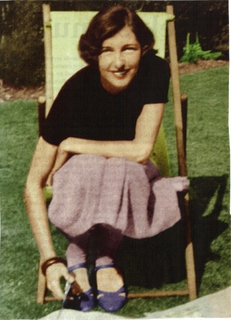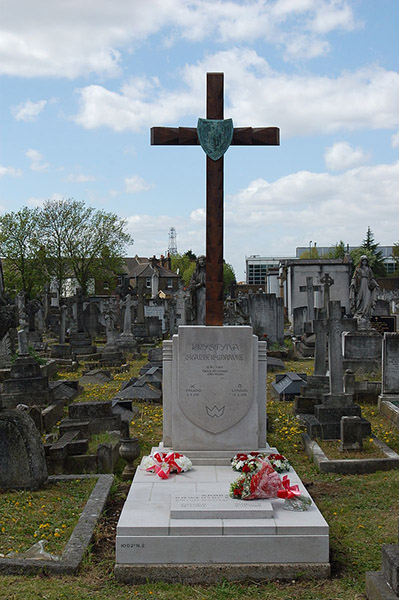Skarbek, Maria Krystyna "Christine Granville"
- Date of birth:
- May 1st, 1908 (Warsaw, Russian Empire)
- Date of death:
- June 15th, 1952 (London, United Kingdom)
- Buried on:
- St Mary Roman Catholic Cemetery
- Nationality:
- Polish
Biography
Special Operations Executive (SOE) agent. Murdered in London.
Do you have more information about this person? Inform us!
- Period:
- Second World War (1939-1945)
- Unit:
- F Section, Special Operations Executive (SOE), British Government
- Awarded on:
- 1947
Miss Mary Christine Granville is a Polish patriot of high integrity who has been employed by this organization for four years, much of the time on work of the most dangerous nature inside occupied Europe. During this time her work has been not short of remarkable and of the greatest value to the Allied cause. She is now in the process of becoming a British subject and of, in fact, being commissioned into the W.A.A.F.
On the night of the 6th/7th of July she was infiltrated into Southern France by parachute to act as liaison officer to the chief of the area, a British Field Officer working with the Maquis [the French resistance movement]. She was also commissioned in view of her exceptional language qualifications and experience in such matters, to work on the possibilities of the subversion of satellite enemy troops [troops from countries occupied by Germany who had been forced to join the German army]. This last field had not previously been exploited by this organization in France.
She started work immediately and within a week reported that she had done the preparatory work on the subversion of Polish troops in the German Army, and that the possibilities were considerable. On the 17th July, her Area Commander reported that her work with these troops was already so widespread that it was essential to send another officer to help her.
Extract b
When the invasion [the Allies invaded southern France soon after the D-Day landings in June 1944 which were in northern France] started she remained in the Vercors during the whole of the battle for the plateau and finally escaped through the lines with the French General commanding F.F.I [Free French forces which had left France in 1940 and been in England since then]. South Eastern France, on the day that it fell. During the whole of this time she continued with her work on satellite troops and on her various liaison duties, and in fact was so effective that she was able to report that the Polish troops at Briaricon would be prepared to surrender to the Maquis [the French resistance movement] if certain conditions were fulfilled.
From the Vercors, she was sent to Col de Larche on the Italian frontier where she personally managed to effect an important liaison, which had not previously been successful, with Col Marzzalani of the Italian Maquis. Later she penetrated into Northern Italy where she remained on another important liaison mission, often under fire, for the next two weeks.
Extract c
On the 13th August 44, the senior British officer of the Area together with his 2nd in Command and a French Major of his team were captured by the Gestapo and were committed to the Gestapo prison at Digne. This was a serious blow to clandestine [undercover] operations in that area particularly as it was only two days before the Allied landing in the South of France. Immediately this happened, Miss Granville took over the work of the whole mission, in addition to her own, until the newly appointed successor to the senior British officer arrived, when she both put him fully in the picture, and in touch with the necessary contacts. At the same time single handed she set about getting the three officers away from the Gestapo. She spent the first three days finding out the size of the guards with a view to organizing a raid on the prison, but when this was found to be impracticable she, alone, and fully appreciating the risk she ran, and that on paper her task would appear impossible, went to the Prison to see the head of the Gestapo himself, and in the Gestapo office subsequently was interviewed by all of the Gestapo officers except one, a total of eight, each of whom entered the room armed and by that time aware that she was an enemy agent, and fully intending to arrest her. In spite of all these things however, by a series of amazing stories and threats she persuaded one of their number to release all three of the officers even though each of them had already been condemned to death as enemy agents and were due to be shot 12 hours afterwards.
The nerve, coolness, and devotion to duty and high courage of this lady which inspired and brought to successful conclusion this astonishing coup de main [act of bravery] must certainly be considered as one of the most remarkable personal exploits of the war and in the particular circumstances I have the honour to recommend that her courage be recognized by the immediate award of the George Cross.
- Period:
- Second World War (1939-1945)
- Unit:
- F Section, Special Operations Executive (SOE), British Government
- Awarded on:
- May 20th, 1947
- Period:
- Second World War (1939-1945)
- Unit:
- F Section, Special Operations Executive (SOE), British Government
With palm
- Period:
- Second World War (1939-1945)
- Period:
- Second World War (1939-1945)
- Period:
- Second World War (1939-1945)
- Period:
- Second World War (1939-1945)
Sources
- - The National Archives Learning Curve | World War II | Western Europe 1939-1945: Resistance & SOE | What was the role of Special Operations Executive and what kind of people worked for it?
- https://www.thegazette.co.uk/London/issue/37959/supplement/2249/data.pdf
- Polish spy Krystyna Skarbek remembered - BBC News
- Madeleine Masson, Christine: A Search for Christine Granville, G.M., O.B.E., Croix de Guerre










